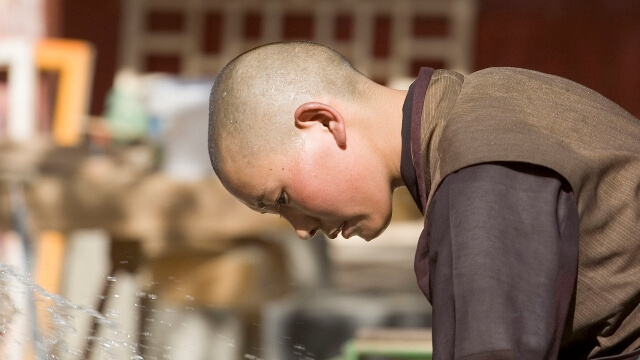Accounts of sexual abuse of detained Uyghur and ethnic Kazakh women are highly believable. Buddhist nuns are also raped in Tibet’s transformation through education camps, where rape is used as a tool for re-education.
by Massimo Introvigne

At the end of January, a confidential report by the German Foreign Ministry about Xinjiang’s transformation through education camps was leaked to some German media. It revealed that, while the CCP claims the camps are simply “vocational schools,” they are in fact horrific jails where, in addition to torture and extra-judicial killing, sexual abuse of female inmates is regularly reported.
A few days before, The New York Times published a feature article by a reporter who had been to Kazakhstan and has interviewed ethnic Kazakhs and Uyghurs who had escaped there from the camps in Xinjiang. What she learned there was far away from the whitewashed accounts of “vocational schools.” “One man, she wrote, was caged underground in a police station, beaten until he lost the hearing in one ear.” Others “were shackled and strung up as if crucified”. It is common to tie inmates to “tiger benches,” chain them, and deprive them of sleep. Muslim inmates are “compelled to renounce religion” and “forced to thank Xi [Jinping] every night for the opportunity to be so enlightened.” The female Times reporter also encountered reports of sexual abuse.
Are these accounts believable? Last week, the debate hit Columbia University in New York when a student criticized the University’s magazine, which is very keen to denounce sexual abuse in other circumstances, for an article about the Xinjiang camps where reports of torture and rape were ignored.
Somewhat missing in the discussion is that rape as part of the CCP “re-education” is not new. Tibetans have long complained that it also exists in the “transformation through education camps” in Tibet. Yes, the same camps are present in Tibet, and with the same name. In Tibetan, it is lobso yosang teyney khang (སློབ་གསོ་ཡོ་བསྲང་ལྟེ་གནས་ཁང་), which is the equivalent of jiaoyu zhuanhua (教育转化), normally translated as “transformation through education” camps. Not surprisingly, the same horrible accounts come from Tibet as they do from Xinjiang.
In 2018, the highly respected Tibetan Center for Human Rights and Democracy published the account of a Buddhist monk who had been detained in the transformation through education camp in Sog (in Chinese, Suo) County, Nagchu Prefecture, Tibet Autonomous Region. Both laypersons and monks and nuns were incarcerated there. They had to endure exhausting military drills and were compelled to denounce the Dalai Lama and sing CCP songs.
The monk reported that after the military drills the women, particularly the Buddhist nuns, were abused and raped taking advantage of their exhaustion. “Many nuns would lose consciousness during the drills, he wrote. Sometimes officers would take unconscious nuns inside where I saw them fondle the nuns’ breasts and grope all over their body.” Afterwards, the guards would spend the night in the nuns’ cells. The monk was told by female inmates about “officers lying in the nuns’ bedroom pressing unconscious nuns underneath.”
Male and female inmates who tried to protest were severely punished. The monk reported that they were hit so badly “with electric batons that they would lose consciousness. The officers would revive the unconscious inmates by splashing water on their faces. This cycle of losing and reviving consciousness would go on for some time at the end of which the officers would use a black plastic pipe to beat and pour water on all parts of the body and then use electric batons to beat some more. Soon black and blue marks would appear on the victim’s body and render him or her half-dead.”
Rape is not only a way to satisfy the prison guards’ lust. As the Catholic daily La Croix International reported, rape is in its own way a tool for re-education, as once “defiled” Buddhist nuns do not feel they can return to the monasteries and continue with their monastic life. The daily reported systematic rape of nuns in Tibet has been going on for decades.
Other female prisoners of conscience from banned religious groups are also raped. Falun Gong reports systematic sexual abuse of its female practitioners in Chinese jails. In my book about The Church of Almighty God, I told myself the story, which is supported by documents, of Sister Jiang Guizhi (1966-2013), a member of that church who was raped by policemen and died as a result of mistreatment and torture. There is more than one sign that Muslim women in Xinjiang are becoming the next victims of the same policy.
Source: Bitter Winter












